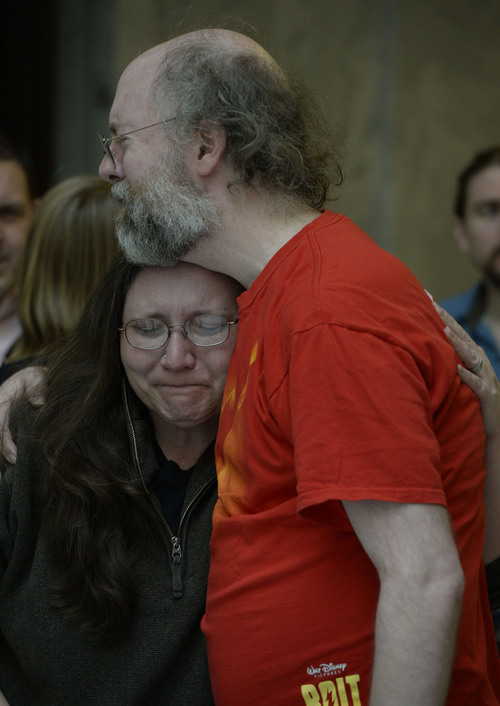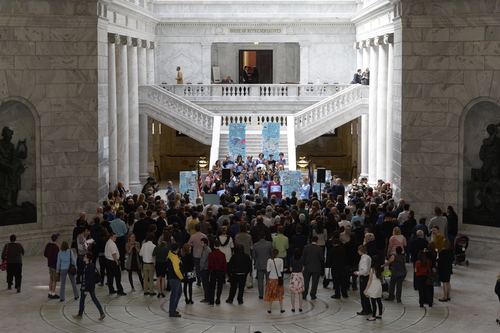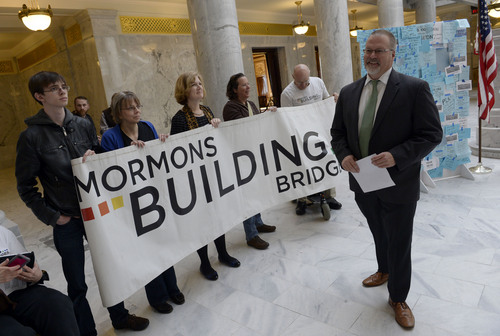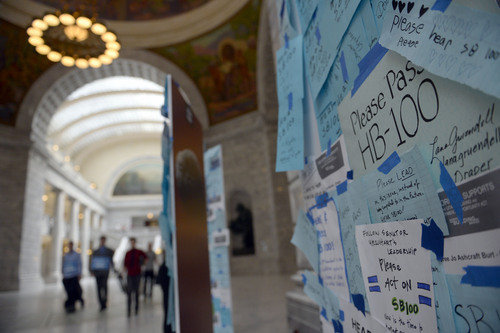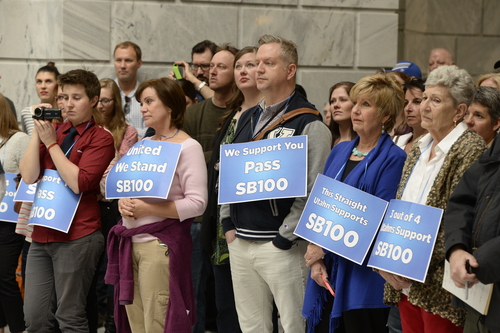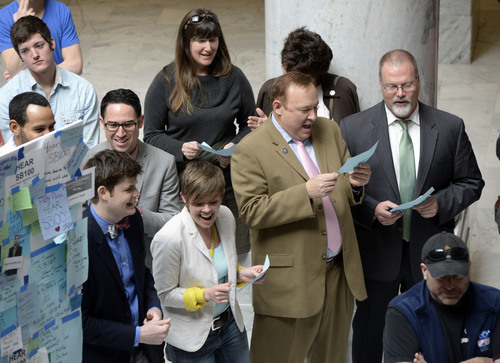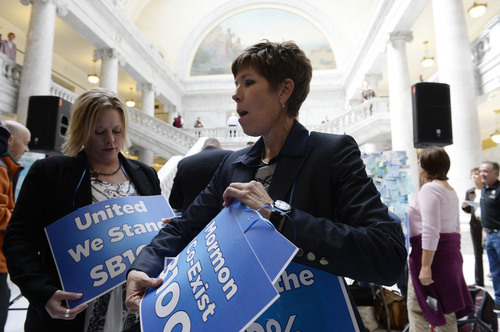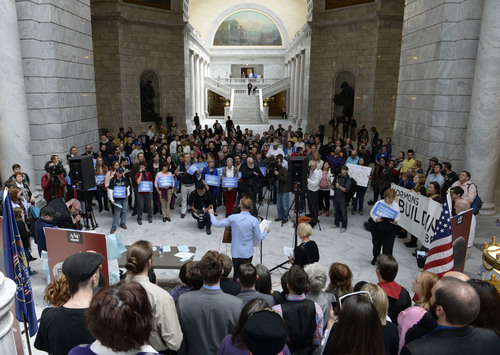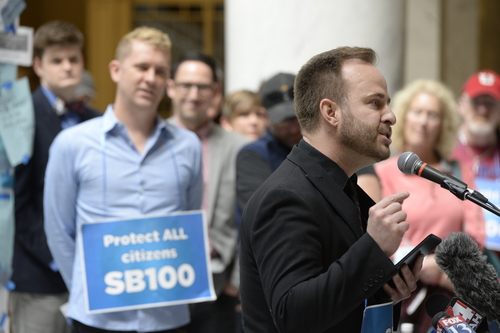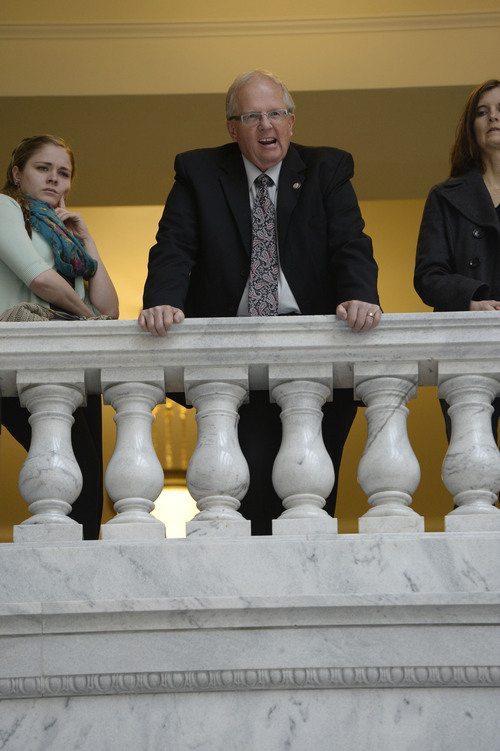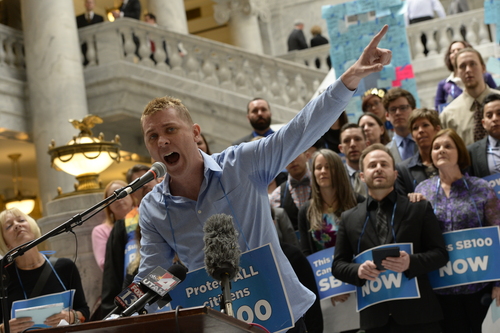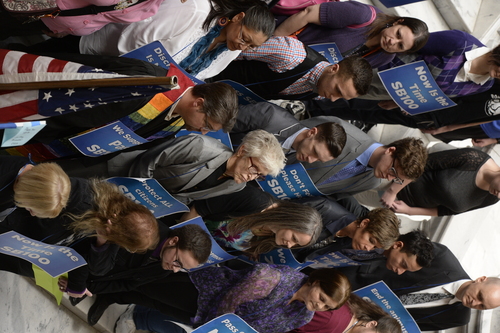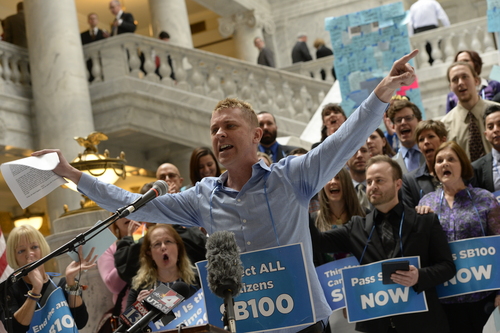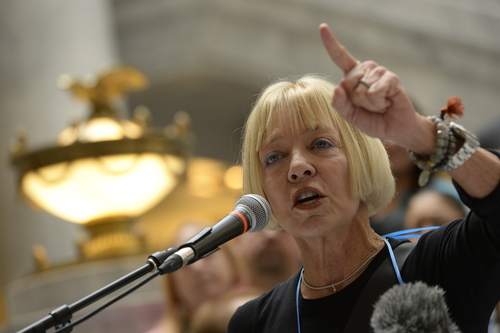Francisco Kjolseth | The Salt Lake Tribune
Mark Walton hugs his good friend from 3rd grade, Ola Robinson who is lesbian as he ex
Francisco Kjolseth | The Salt Lake Tribune
Supporters of SB100 that would prohibit discrimination based on sexual orientation ra
Francisco Kjolseth | The Salt Lake Tribune
Senator Stephen Urquhart, R-St. George, joins supporters of SB100, which he sponsors
Francisco Kjolseth | The Salt Lake Tribune
Supporters of SB100 that would prohibit discrimination based on sexual orientation ra
Francisco Kjolseth | The Salt Lake Tribune
Supporters of SB100 that would prohibit discrimination based on sexual orientation ra
Francisco Kjolseth | The Salt Lake Tribune
Senators Jim Dabakis, D-Salt Lake City, second from right, and Stephen Urquhart, R-St
Francisco Kjolseth | The Salt Lake Tribune
Michelle Turpin, one of the original Capitol 13 who was arrested a few weeks back, ha
Francisco Kjolseth | The Salt Lake Tribune
Supporters of SB100 that would prohibit discrimination based on sexual orientation ra
Francisco Kjolseth | The Salt Lake Tribune
Supporters of SB100 that would prohibit discrimination based on sexual orientation ra
Francisco Kjolseth | The Salt Lake Tribune
Matt Landis, owner of Landis Salons, shares his experience of discrimination for bein
Francisco Kjolseth | The Salt Lake Tribune
Representative Mike Noel, R-Kanab, watches from above as supporters of SB100 that wou
Francisco Kjolseth | The Salt Lake Tribune
Surrounded by supporters, activist Troy Williams vows to never give up his efforts to
Francisco Kjolseth | The Salt Lake Tribune
Supporters of SB100 that would prohibit discrimination based on sexual orientation ra
Francisco Kjolseth | The Salt Lake Tribune
Surrounded by supporters, activist Troy Williams vows to never give up his efforts to
Francisco Kjolseth | The Salt Lake Tribune
Donna Weinholtz, one of the Capitol 13 activist who was arrested a few weeks back, sp
Francisco Kjolseth | The Salt Lake Tribune
Mark Walton hugs his good friend from 3rd grade, Ola Robinson who is lesbian as he expresses his support alongside others for SB100 that would prohibit discrimination based on sexual orientation rally at the Utah State Capitol on Wednesday, March 5, 2014. Though polls indicate a majority of Utahns support the idea, legislative leaders have said they won't hear any bills related to lesbian, gay, bisexual and transgender issues this year, including other proposals less friendly to the LGBT community as the state defends its ban on gay marriage in court.
Francisco Kjolseth | The Salt Lake Tribune
Supporters of SB100 that would prohibit discrimination based on sexual orientation rally at the Utah State Capitol on Wednesday, March 5, 2014. Though polls indicate a majority of Utahns support the idea, legislative leaders have said they won't hear any bills related to lesbian, gay, bisexual and transgender issues this year, including other proposals less friendly to the LGBT community as the state defends its ban on gay marriage in court.
Francisco Kjolseth | The Salt Lake Tribune
Senator Stephen Urquhart, R-St. George, joins supporters of SB100, which he sponsors and would prohibit discrimination based on sexual orientation rally at the Utah State Capitol on Wednesday, March 5, 2014. Though polls indicate a majority of Utahns support the idea, legislative leaders have said they won't hear any bills related to lesbian, gay, bisexual and transgender issues this year, including other proposals less friendly to the LGBT community as the state defends its ban on gay marriage in court.
Francisco Kjolseth | The Salt Lake Tribune
Supporters of SB100 that would prohibit discrimination based on sexual orientation rally at the Utah State Capitol on Wednesday, March 5, 2014. Though polls indicate a majority of Utahns support the idea, legislative leaders have said they won't hear any bills related to lesbian, gay, bisexual and transgender issues this year, including other proposals less friendly to the LGBT community as the state defends its ban on gay marriage in court.
Francisco Kjolseth | The Salt Lake Tribune
Supporters of SB100 that would prohibit discrimination based on sexual orientation rally at the Utah State Capitol on Wednesday, March 5, 2014. Though polls indicate a majority of Utahns support the idea, legislative leaders have said they won't hear any bills related to lesbian, gay, bisexual and transgender issues this year, including other proposals less friendly to the LGBT community as the state defends its ban on gay marriage in court.
Francisco Kjolseth | The Salt Lake Tribune
Senators Jim Dabakis, D-Salt Lake City, second from right, and Stephen Urquhart, R-St. George, to his right, sing Katy Perry's song Roar as supporters of SB100 that would prohibit discrimination based on sexual orientation rally at the Utah State Capitol on Wednesday, March 5, 2014. Though polls indicate a majority of Utahns support the idea, legislative leaders have said they won't hear any bills related to lesbian, gay, bisexual and transgender issues this year, including other proposals less friendly to the LGBT community as the state defends its ban on gay marriage in court.
Francisco Kjolseth | The Salt Lake Tribune
Michelle Turpin, one of the original Capitol 13 who was arrested a few weeks back, hands out banners to supporters of SB100 that would prohibit discrimination based on sexual orientation rally at the Utah State Capitol on Wednesday, March 5, 2014. Though polls indicate a majority of Utahns support the idea, legislative leaders have said they won't hear any bills related to lesbian, gay, bisexual and transgender issues this year, including other proposals less friendly to the LGBT community as the state defends its ban on gay marriage in court.
Francisco Kjolseth | The Salt Lake Tribune
Supporters of SB100 that would prohibit discrimination based on sexual orientation rally at the Utah State Capitol on Wednesday, March 5, 2014. Though polls indicate a majority of Utahns support the idea, legislative leaders have said they won't hear any bills related to lesbian, gay, bisexual and transgender issues this year, including other proposals less friendly to the LGBT community as the state defends its ban on gay marriage in court.
Francisco Kjolseth | The Salt Lake Tribune
Supporters of SB100 that would prohibit discrimination based on sexual orientation rally at the Utah State Capitol on Wednesday, March 5, 2014. Though polls indicate a majority of Utahns support the idea, legislative leaders have said they won't hear any bills related to lesbian, gay, bisexual and transgender issues this year, including other proposals less friendly to the LGBT community as the state defends its ban on gay marriage in court.
Francisco Kjolseth | The Salt Lake Tribune
Matt Landis, owner of Landis Salons, shares his experience of discrimination for being gay while surrounded by supporters of SB100 that would prohibit discrimination based on sexual orientation rally at the Utah State Capitol on Wednesday, March 5, 2014. Though polls indicate a majority of Utahns support the idea, legislative leaders have said they won't hear any bills related to lesbian, gay, bisexual and transgender issues this year, including other proposals less friendly to the LGBT community as the state defends its ban on gay marriage in court.
Francisco Kjolseth | The Salt Lake Tribune
Representative Mike Noel, R-Kanab, watches from above as supporters of SB100 that would prohibit discrimination based on sexual orientation rally at the Utah State Capitol on Wednesday, March 5, 2014. Though polls indicate a majority of Utahns support the idea, legislative leaders have said they won't hear any bills related to lesbian, gay, bisexual and transgender issues this year, including other proposals less friendly to the LGBT community as the state defends its ban on gay marriage in court.
Francisco Kjolseth | The Salt Lake Tribune
Surrounded by supporters, activist Troy Williams vows to never give up his efforts to pass SB100 that would prohibit discrimination based on sexual orientation during a rally at the Utah State Capitol on Wednesday, March 5, 2014. Though polls indicate a majority of Utahns support the idea, legislative leaders have said they won't hear any bills related to lesbian, gay, bisexual and transgender issues this year, including other proposals less friendly to the LGBT community as the state defends its ban on gay marriage in court.
Francisco Kjolseth | The Salt Lake Tribune
Supporters of SB100 that would prohibit discrimination based on sexual orientation rally at the Utah State Capitol on Wednesday, March 5, 2014. Though polls indicate a majority of Utahns support the idea, legislative leaders have said they won't hear any bills related to lesbian, gay, bisexual and transgender issues this year, including other proposals less friendly to the LGBT community as the state defends its ban on gay marriage in court.
Francisco Kjolseth | The Salt Lake Tribune
Surrounded by supporters, activist Troy Williams vows to never give up his efforts to pass SB100 that would prohibit discrimination based on sexual orientation during a rally at the Utah State Capitol on Wednesday, March 5, 2014. Though polls indicate a majority of Utahns support the idea, legislative leaders have said they won't hear any bills related to lesbian, gay, bisexual and transgender issues this year, including other proposals less friendly to the LGBT community as the state defends its ban on gay marriage in court.
Francisco Kjolseth | The Salt Lake Tribune
Donna Weinholtz, one of the Capitol 13 activist who was arrested a few weeks back, speaks in support of SB100 that would prohibit discrimination based on sexual orientation rally at the Utah State Capitol on Wednesday, March 5, 2014. Though polls indicate a majority of Utahns support the idea, legislative leaders have said they won't hear any bills related to lesbian, gay, bisexual and transgender issues this year, including other proposals less friendly to the LGBT community as the state defends its ban on gay marriage in court.


